九年级英语全册Unit13We’retryingtosavetheearth重难点题组突破课堂导练含
人教九年级英语全册口头翻译精练Unit13We'retryingtosavetheearth完美

The river was dirty.
甚至河底积满废弃物。
Even the bottom of the river was full of rubbish.
但过去是那么的清洁。
But it used to be so clean!
是,可是人们还在往河里扔垃圾。
Yes, but people are throwing litter into the river.
是什么引起了这样的问题?
What caused the problem?
人们一直往河里扔垃圾,
People are throwing litter into the river.
工厂正把废品往河里堆。
Factories are putting rubbish into the river.
应该如何解决这个问题?
附近处的空气已经严重污染,
The air has become really polluted around here.
我正担忧着。
I’m getting very worried.
是啊,我以前能看到天上的星星。
Yes, I used to be able to see stars in the sky.
How should the problem be solved?
我们应该给政府写信下令关闭工厂,
We should write to the government and ask them to close down the factories.
每个人应该伸出援助之手清洁河水。
Everyone should help to clean up the river.
是,或者骑自行车。
人教版九年级英语全册Unit13We’retryingtosavetheearth!单元整体教学设计

三、教学重难点和教学设想
(一)教学重难点
1.词汇:环保专业词汇的掌握和运用,如recycle, reuse, reduce, sustainable development等;
例如:对于基础薄弱的学生,重点巩固词汇和语法,提高其自信心;对于优秀生,增加拓展性练习,提高其挑战性。
6.结合课后作业和课堂反馈,及时了解学生的学习进度,调整教学策略;
例如:通过课后作业,了解学生在词汇和语法方面的掌握情况,针对性地进行辅导。
7.情感态度培养方面,组织学生参与环保活动,如垃圾分类、节能减排等,使其亲身体验环保行动的重要性;
3.学生在阅读理解方面,具备获取文章主旨和部分细节信息的能力,但面对长篇阅读材料,快速捕捉关键信息的能力仍有待提高;
4.在写作方面,学生能够完成简单的描述性写作任务,但针对环保话题的议论性写作,可能缺乏观点论证和逻辑表达能力;
5.情感态度方面,学生对环保问题有一定的关注,但可能缺乏实际行动和深入思考。
3.引导学生进行自主、合作、探究式学习,培养学生的问题解决能力和团队协作精神;
4.利用多媒体教学资源,如图片、视频等,辅助教学,提高学生的学习效果;
5.注重反馈与评价,及时了解学生的学习情况,调整教学策略,提高教学质量。
(三)情感态度与价值观
1.增强环保意识,树立绿色生活观念,认识到保护环境的重要性;
2.积极参与环保活动,将所学知识运用到实际生活中,为保护地球做出贡献;
3.树立正确的价值观,关注社会问题,具有社会责任感;
人教版英语九年级全册Unit13We'retryingtosavetheearth!SectionA

一、改写句子1. Jim used to be confident about himself. (改为一般疑问句)________ Jim ________ to be confident about himself.2. Six boys are singing under the trees now.(改为一般疑问句)________ six boys ________ under the trees now?3. Kangkang went to Lake Dingshan yesterday. And now he is back in.(合并为一句)Kangkang ________ ________ to Lake Dingshan.4. Grace used to be afraid of the dark when she was a little girl.(变否定句)Grace ________ ________ to be afraid of the dark when she was a little girl.5. He often rode a bike to work when he was young, but he doesn’t do so now. (改为简单句)He ___________ _____________ ride a bike when he was young.二、单项选择6. Everything has two sides. Beautiful songs, sometimes, ________ be just noise to others.A.must B.can C.should7. My grandmother often puts her rich experience ________ good use to help us in our daily lives.A.on B.in C.to D.for8. —Who is playing the piano in the music room? Is it Mary?—No, it ________ be her. She has ________ to Beijing on business.A.couldn’t; been B.can’t; gone C.can’t; been D.mustn’t; gone9. — ________ I finish the work this week, sir?—No, you ________. You can finish it till next Wednesday.A.Must; mustn’t B.Must; needn’t C.Can; needn’t D.Can; mustn’t10. —Show me your health code (码) please, either on Wechat or Alipay.— ________. Here it is.A.It’s nothing B.Be careful C.Go ahead D.No problem11. —May I bring my mobile phone to school?—No, you ________. The new rule “no phones in schools” came out i n March this year.A.needn’t B.mustn’t C.shouldn’t12. Last year, a new old people’s home ________ in our community.A.builds B.built C.is built D.was built13. —People should use public transportation more often.—______.A.Never mind B.Not at all C.No problem D.I agree14. —Timmy, you ________ drink cold water because you have a cold.—Sorry, Mom.A.need B.needn’t C.should D.shouldn’t15. —The computer looks so old. When did you buy it?—My father ________ it for ten years.A.has had B.has bought C.have had D.have bought三、句型转换16. We must send the sick man to the hospital.(将主动语态的句子改成被动语态)_________________________________________________17. We watered the flowers yesterday.(改为被动语态)The flowers ________ ________ yesterday.18. He has been to England twice.(就划线部分提问)_________ _________ times has he been to England ?19. He wrote this book last year. (改为被动语态)This book ________ ________ last year.20. The government doesn’t allow factories to release harmful gases into the air.(改为被动语态)Factories ________ ________ by the government to release harmful gases into the air.四、单词拼写21. —Where’s your brother?—He is t________ his dog in the field.22. The sun is _____________ (照耀) and it makes us feel very warm.23. The thief is running away and the police are s_________ for him.24. 根据句意及首字母提示补全单词1. The new dictionary c________ him ten dollars.2. Eating too much chocolate is h________ to your health.3. P________ Xi Jinping visited Kazakhstan in June, 2017.4. We can protect the environment by r________ paper.5. Shall we meet at the school g________ at 7:00 a.m. tomorrow?25. The things that you don’t need anymore can actually be p__________to good use.五、用所给单词的正确形式填空26. It is said that a girl named Jones ________ (kill) in the accident.27. I think they ________ (plan) the warm-up part for the party. Let’s join them.28. This is an ____(danger) animal. We should try to save it.29. An elderly couple as well as a child ________ (notice) to enter the building just now.30. My hometown ________ (change) a lot in the last few years.六、完成句子31. 你经常参加这样的会议吗?Do you often __________ __________ in the meeting like this?32. 我将永远记得这三年以来总是严格要求我的老师们。
人教版九年级英语全册Unit13We'retryingtosavetheearth!优秀教学案例
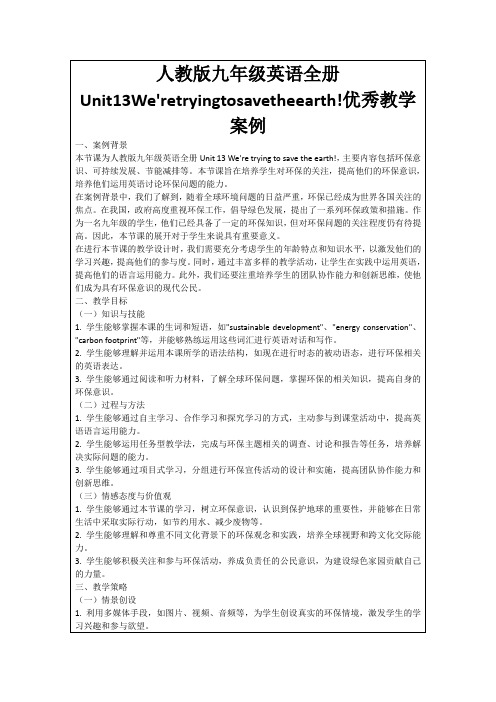
(三)情感态度与价值观
1.学生能够通过本节课的学习,树立环保意识,认识到保护地球的重要性,并能够在日常生活中采取实际行动,如节约用水、减少废物等。
2.学生能够理解和尊重不同文化背景下的环保观念和实践,培养全球视野和跨文化交际能力。
(四)反思与评价
1.教师引导学进行自我反思,评估自己在环保知识掌握和技能运用方面的进步,培养他们的自我监控和自我调整能力。
2.学生通过互评和小组评价,相互借鉴和学习,提高自己的环保意识和语言运用能力。
3.教师对学生的学习过程和成果进行综合评价,关注他们的全面发展,鼓励他们的创新和实践精神。同时,根据评价结果调整教学策略,提高教学效果。
2.学生通过完成作业,进一步巩固本节课所学内容,提高他们的语言运用能力。
3.教师对学生的作业进行评价,关注他们的全面发展,鼓励他们的创新和实践精神。同时,根据评价结果调整教学策略,提高教学效果。
五、案例亮点
1.创新的情景创设:本节课通过多媒体手段,如图片、视频等,为学生创设了丰富的环保情境,使学生身临其境地感受到环保问题的紧迫性。这种创新的情景创设方式不仅激发了学生的学习兴趣,而且提高了他们的参与度和学习效果。
四、教学内容与过程
(一)导入新课
1.教师通过展示一张地球的照片,引导学生关注地球的美丽和脆弱,引出本节课的主题——环保。
2.教师提问:“你们对环保有什么了解和看法?”让学生分享自己的知识和观点,激发他们的学习兴趣和参与欲望。
3.教师播放一段关于环保问题的新闻报道,让学生了解全球环保形势的严峻性,引出本节课的学习目标——提高环保意识,学习英语表达环保观点。
4.反思与评价的全面评估:教师引导学生进行自我反思,评估自己在环保知识掌握和技能运用方面的进步。同时,教师对学生的学习过程和成果进行综合评价,关注他们的全面发展。这种反思与评价的方式有助于培养学生的自我监控和自我调整能力,提高他们的批判性思维和创造性思维。
九年级英语全册Unit13We'retryingtosavetheearth(第2课时)Sectio
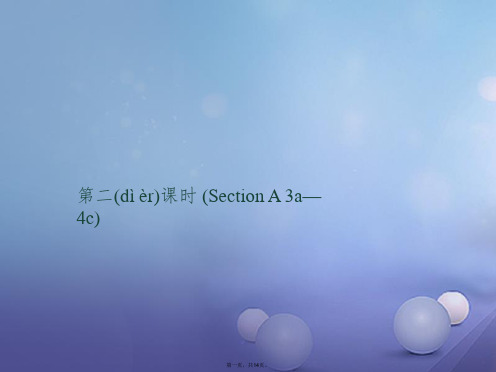
especially
第三页,共14页。
二、用方框中所给单词或短语的适当形式(xíngshì)填空。(5×3分
=15分) be harmful tsoci,enhteifaicr of,no longer,so far,science
6.The ______________work should have something to do with
words.
southern
2.Shark fin soup is very popular in ______________(south)
China.
3.Too much noise is h_a_r_m__fu__l ________(harm) to people's
health.
wooden
in this
traded
industry every year.The number of some kinds of sharks has fallen by
over 90 percent in the last 20 to 30 years.
第十三页,共14页。
Environmental 33. protection groups around the world,such
第十一页,共14页。
六、根据短文内容,用方框中所给词的适当形式(xíngshì)填 空,完成短文。(每个词语限用一次)(10×2分=20分) show,danger,protection,realize,top, develop,die,cruel,trade,catch Many have heard of shark fin soup.This famous and expensive dish is especially popular in southern China.But do you 26. _________that you're killing a
人教版九年级英语全册Unit13We'retryingtosavetheearth!教学设计
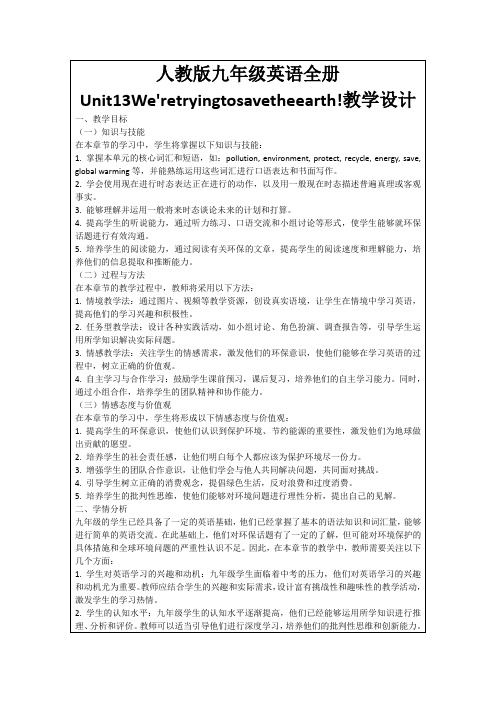
4.引导学生树立正确的消费观念,提倡绿色生活,反对浪费和过度消费。
5.培养学生的批判性思维,使他们能够对环境问题进行理性分析,提出自己的见解。
二、学情分析
九年级的学生已经具备了一定的英语基础,他们已经掌握了基本的语法知识和词汇量,能够进行简单的英语交流。在此基础上,他们对环保话题有了一定的了解,但可能对环境保护的具体措施和全球环境问题的严重性认识不足。因此,在本章节的教学中,教师需要关注以下几个方面:
2.写作作业:
-根据课堂讨论的环保问题,结合自己的观点,写一篇关于环保的短文。要求使用现在进行时态、一般现在时态和一般将来时态,不少于80词。
3.阅读作业:
-阅读一篇关于环保的英文文章,并完成相应的阅读理解练习。要求学生在阅读过程中,关注文章中的环保词汇和表达,提高阅读素养。
4.课后实践:
-学生在课后参加一次环保活动,如捡拾垃圾、植树等,并拍照记录。下节课向同学分享自己的实践经历,阐述环保行动的意义。
7.课后辅导,巩固知识:针对学生的学习情况,进行课后辅导,帮助他们巩固所学知识,提高学习效果。
8.家校合作,共同教育:与家长保持沟通,共同关注学生的学习情况和环保行为,形成家校共育的良好局面。
1.让学生掌握本章节的知识点和技能,提高他们的英语水平。
2.培养学生的环保意识,使他们成为具有社会责任感的人。
3.教学步骤:
a.教师呈现本节课的重点词汇和短语,引导学生跟读、记忆;
b.教师通过示例句型,讲解现在进行时态、一般现在时态和一般将来时态的用法;
c.学生进行口头练习,巩固所学知识;
d.教师讲解语法点,让学生理解并掌握语法规则;
九年级英语全册Unit13We’retryingtosavetheearthSect
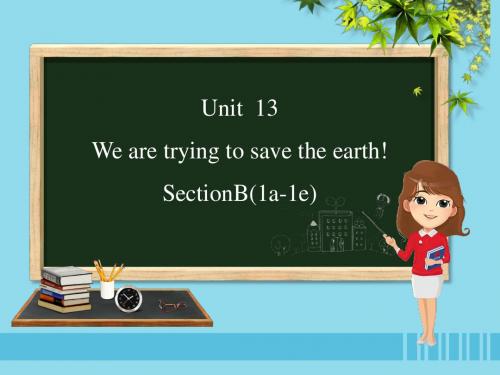
✔ ✔
✔
Things Things Julia and Julia is Jack talk about doing now ___ taking your own bags when shopping ____not riding in cars ____ riding a bike
✔
Things Julia will do in the future
Unit 13
We are trying to save the earth!
SectionB(1a-1e)
1.To learn to use new words and expressions 2.To know the protection of our earth. stop riding in cars recycle books and paper turn off the lights
1 turn off the lights when you leave a room _____
_____ 3 turn off the shower while you are washing your hair
_____ 4 don’t use paper napkin
1b Compare your answers in 1a with your partner.
A: Recycling paper is really easy. B: I agree. But it’s hard to stop riding in cars.
1c
Listen and check (✔) the things that Julia and Jack talk about.
Words and expressions Review
人教版九年级英语全册Unit13We’retryingtosavetheearth!教学设计
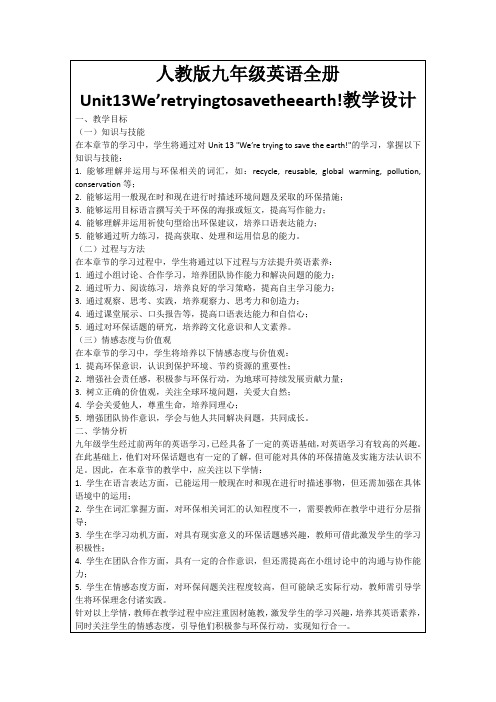
(3)海报制作:让学生分组制作环保海报,运用所学词汇和表达方式。
4.课后作业:
(1)要求学生撰写一篇关于环保的短文,巩固写作能力;
(2)鼓励学生参与环保活动,记录自己的行动和感受,提高实践能力。
5.评价与反馈:
(1)教师针对学生在课堂活动中的表现,给予及时、具体的评价;
-播放一段关于环保行动的听力材料,学生听后回答相关问题。
-教师引导学生总结听力材料中的关键信息,帮助学生提高获取、处理和运用信息的能力。
(三)学生小组讨论
1.教师将学生分成小组,每组选择一个环保主题,如:节约用水、减少塑料污染等。
2.小组内讨论以下问题:
- What are the main environmental problems related to your topic?
人教版九年级英语全册Unit13We’retryingtosavetheearth!教学设计
一、教学目标
(一)知识与技能
在本章节的学习中,学生将通过对Unit 13 "We’re trying to save the earth!"的学习,掌握以下知识与技能:
1.能够理解并运用与环保相关的词汇,如:recycle, reusable, global warming, pollution, conservation等;
1.完成课本练习册中与本课相关的练习题,特别是词汇填空、语法填空和听力练习,以加深对环保词汇和语法的掌握。
2.结合课堂所学,制作一份关于环保的海报,内容包括:环保主题、现状介绍、具体措施和建议。要求设计新颖,语言表达清晰,图文并茂。
3.撰写一篇短文,以“我的环保行动”为主题,描述自己在日常生活中实施的环保措施,以及对环保的认识和体会。字数在100-120词左右,要求使用一般现在时和现在进行时描述。
UNIT13Weretryingtosavetheearth原文与翻译

UNIT13We'retryingtosavetheearth原文与翻译《牛津初中英语》充分体现了《新课标》的诸多精神。
该教材具有两大特点。
下面是小偏整理的UNIT13We'retryingtosavetheearth 原文与翻译,感谢您的每一次阅读。
UNIT13We'retryingtosavetheearth原文与翻译SectionA1bListenandcompletethesentences.Tony:Hey,Mark,maybewecouldgoswimmingintheriverlaterthi safternoon.Mark:Idon’tthinkIwanttogo,Tony.Tony:Whynot?Mark:Iwastherelastweekendandtheriverwasreallydirty.Eventh ebottomoftheriverwasfullofrubbish,andtherewerenomorefishforf ishermentocatch.Tony:Noway!Itusedtobesoclean.Infact,ithasalwaysbeentheni cestriverinthistown.Mark:Notanymore.Ithinkpeoplearethrowinglitterintotheriver. Factoriesarealsoputtingwasteintotheriver.Tony:That’sterrible!Weshouldwritetothegovernment.Theys houldclosedownthefactories.Mark:Goodidea!ButIthinkeveryoneinthistownshouldhelptocl eanuptheriver,too.Everyoneshouldplayapart,notjustthegovernm entSectionA2aListentotheinterview.thekindsofpollutionthatJasonandSusan talkabout.Interviewer:T odaywe’retalkingtoJason andSusanaboutenvir onmentalproblems.JasonandSusan,canyoutellusaboutsomeofth eproblemsyou’veseen?Jason:Ithinkoneproblemisthattheairisbadlypolluted.Ihardlye verseeblueskiesanymore.Susan:Yes,andIusedtoseethestarsclearly.Interviewer:Whatdoyouthinkhascausedthisproblem?Susan:Well,therearemorecarsontheroadthesedays.Jason:Andfactoriesthatburncoalalsopollutetheairwithalotofb lacksmoke.Interviewer:Whatotherproblemsdoyousee?Susan:Iguessthere’stoomuchrubbishandwasteinthestreets.Jason:Yes!Everydaypeoplearethrowingawaythingslikewoode nchopsticks,plasticbowlsandplasticbags.Susan:They’realsolitteringinpublicplaces,forexample,durin gpicnicsinparks.Thisisturningbeautifulplacesintouglyones.Interviewer:You’reright.Theseareseriousproble msforourenv ironment.Next,let’stalkaboutthethingswecandotohelp.SectionA2bListenagainandcompletethesentences.Interviewer:T odaywe’retalkingtoJasonandSusanaboutenvir onmentalproblems.JasonandSusan,canyoutellusaboutsomeofth eproblemsyou’veseen?Jason:Ithinkoneproblemisthattheairisbadlypolluted.Ihardlye verseeblueskiesanymore.Susan:Yes,andIusedtoseethestarsclearly.Interviewer:Whatdoyouthinkhascausedthisproblem?Susan:Well,therearemorecarsontheroadthesedays.Jason:Andfactoriesthatburncoalalsopollutetheairwithalotofb lacksmoke.Interviewer:Whatotherproblemsdoyousee?Susan:Iguessthere’stoomuchrubbishandwasteinthestreets.Jason:Yes!Everydaypeoplearethrowingawaythingslikewoodenchopsticks,plasticbowlsandplasticbags.Susan:They’realsolitteringinpublicplaces,forexample,d urin gpicnicsinparks.Thisisturningbeautifulplacesintouglyones.Interviewer:You’reright.Theseareseriousproblemsforourenv ironment.Next,let’stalkaboutthethingswecandotohelp.SectionA2dRoleplaytheconversation.JasonandSusan,whatareyourideasforsolvingtheseproblems?Well,tocutdownairpollution,weshouldtakethebusorsubwayin steadofdriving.Yeah,orrideabike.Thereareotheradvantagesofbikeriding.It'sg oodforhealthitdoesn'tanythingGreatideas!Whataboutwastepollution?Mmm,Ithinksimplethingslikebringingabagtogoshoppingcan help.Istarteddoingthatayearago.Me,tooAlso,Inevertakewoodenchopsticksorplasticforkswhen Ibuytakeawayfood.Iusetheonesathome.Andremembertothrowrubbishinthebinsandkeeppublicplace scleanandbeautifulforeveryone.Sotogether,ouractionscanmakeadifferenceandleadtoabetter future!SectionA3aReadthepassageaboutsharksandcompletethefactsheetbelow.SavetheSharks!Manyhaveheardofsharkfinsoup.Thisfamousandexpensivedis hisespeciallypopularinsouthernChina.Butdoyourealizethaty ou’r ekillingawholesharkeachtimeyouenjoyabowlofsharkfinsoup?Whenpeoplecatchsharks,theycutofftheirfinsandthrowthesha rkbackintotheocean.Thisisnotonlycruel,butalsoharmfultotheenvir onment.Withoutafin,asharkcannolongerswimandslowlydies.Sharksar eatthetopofthefo odchainintheocean’secosystem.Iftheirnumber sdroptoolow,itwillbringdangertoalloceanlife.Manybelievethatsharkscanneverbeendangeredbecausethey arethestrongestintheirfoodchain.Butinfact,around70millionshark sarecaughtandtradedinthisindustryeveryyear.Thenumbersofsomekindsofsharkshavefallenbyover90percen tinthelast20to30years.Environmentalprotectiongroupsaroundthe world,suchasWildAidandtheWWF,areteachingthepublicabout“fi nning”.Theyhaveevenaskedgovernmentstodeveloplawstostopthesal eofsharkfins.Sofar,noscientificstudieshaveshownthatsharkfinsare goodforhealth,sowhyeatthem?Helpsavethesharks!SectionB1cListenandcheck(√)thethingsthatJuliaandJacktalkabout.Jack:Turnoffthelights,Julia.Itsaveselectricity.Julia:Oh,Iusuallydothat.Iwasjustinahurry.Jack:Isee.I’vejustreadabookwh ichgivesideasabouthowweca nsavetheenvironment.Forexample,youshouldturnofftheshowerw henyou’rewashingyourhair.Julia:Oh,Iwouldneverdothat.Ihaveveryshorthair.Itonlytakesaf ewminutestowash.Whatelsedoesitsay?Jack:Youshouldtakeyourownbagswhenyougoshopping.Julia:Oh,that’seasy.I’lldothatfromnowon.Whatelse?Jack:Peopleshouldstopridingincarsandstartridingbikes.Julia:Noway!Itwouldtakeme45minutestogettoschoolbybike!Jack:Butit’sgoodfortheenvironment!Besides,Ilikeridingmybi ke.Julia:Yes,andyoualsoliveclosetoschool!SectionB1dListenagain.Check(√)thethingsthatJuliaisdoingnow,thethings shewilldointhefutureandthethingsshewouldneverdo.Jack:Turnoffthelights,Julia.Itsaveselectricity.Julia:Oh,Iusuallydothat.Iwasjustinahurry.Jack:Isee.I’vejustreadabookwhichgiveside asabouthowweca nsavetheenvironment.Forexample,youshouldturnofftheshowerw henyou’rewashingyourhair.Julia:Oh,Iwouldneverdothat.Ihaveveryshorthair.Itonlytakesaf ewminutestowash.Whatelsedoesitsay?Jack:Youshouldtakeyourownbagswhenyougoshopping.Julia:Oh,that’seasy.I’lldothatfromnowon.Whatelse?Jack:Peopleshouldstopridingincarsandstartridingbikes.Julia:Noway!Itwouldtakeme45minutestogettoschoolbybike!Jack:Butit’sgoodfortheenvironment!Besides,Ilikeridingmybi ke.Julia:Yes,andyoualsoliveclosetoschool!SectionB2bReadthepassageandcompletethechartbelow.Rethink,Reuse,Recycle!Doyouoftenthrowawaythingsyoudon’tneedanymore?Have youeverthoughtabouthowthesethingscanactuallybeputtogoodu se?Nothingisawasteifyouhaveacreativemind.Youhaveprobablyn everheardofAmyHayes,butsheisamostunusualwoman.Shelivesin ahouseintheUKthatshebuiltherselfoutofrubbish.Thewindowsanddoorscomefromoldbuildingsaroundhertow nthatwerepulleddown.Thetopofthehouseisanoldboatturnedupsi dedown.Andthegateinfrontofherhouseismadeofrocksandoldglas sbottles.AmyrecentlywonaprizefromtheHelpSaveOurPlanetSociety.Thepresidentsaid,“Amyisaninspirationtousall.”Amyisn’ttheonlyonewhoisgoodatrecycling.JessicaWongfro mHongKongusesoldclothesthatpeop ledon’twearanymoretoma kebags.Shehasbeendoingthisforafewyearsnow.Sheopenedasmallshopwhereshesellsherbags,andshehasalso setupawebsitetosellthemonline.Sheespeciallylikestouseoldjeanst omakehandbags.Herbagsarecuteanduseful.“Iplantowriteabookaboutnewwaystouseoldclothes,”shesai d.“Ihopepeoplecanreadmybookandenjoyit!”WangTaosetupasmallbusinessinShanghaifouryearsago.Heisk nownforusingironandothermaterialsfromoldcarstomakebeautifu lartpieces.Somearelargepiecesthatlooklikeanimalsorhumans,and somearesmallerpiecesyoucanputathome.Themorepopularworks canevenbeseeninartshopsaroundthecity.WangTaohopestosetupa“metalart”themeparktoshowpeop letheimportanceofenvironmentalprotection.Notonlycantheartbri nghappinesstoothers,butitalsoshowsthatevencold,hardironcanb ebroughtbacktolifewithalittlecreativity.翻译:SectionA2d采访者:贾森和苏珊,对于解决这些问题,你们有什么想法?贾森:为了减少空气污染,我们应该乘坐公共汽车或者地铁,而不是开车。
九年级英语全册unit13we’retryingtosave
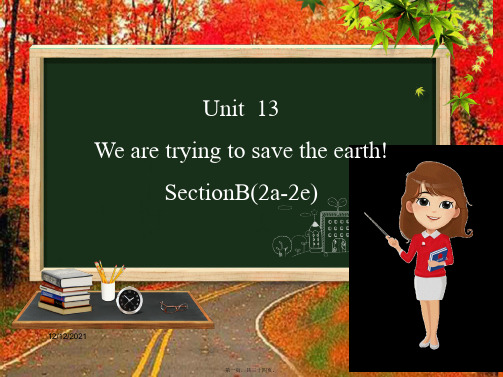
12/12/2021
第十六页,共三十四页。
Things which can be done by people every day:
• take your own bags when you go shopping
• spend less time in the shower
• turn off the lights when you leave a room
cute and useful. “I plan to write a book about new ways to use old clothes,” she said.
“I hope people can read my book and enjoy it!”
12/12/2021
第八页,共三十四页。
第二页,共三十四页。
Words and expressions Review
throw away
put sth. to good use
pull......down upside down
gate
bottle
president
inspiration iron
work
metal bring back
ห้องสมุดไป่ตู้
4. Jessica Wong sells her bags in a small
shop, but she has also _____an online business
to sell them.
set up
5. Though Jessica’s bags are made from old
clothes,her bags are _________being cute and
人教版英语九年级全册Unit13We’retryingtosavetheearth!大单元教学设计
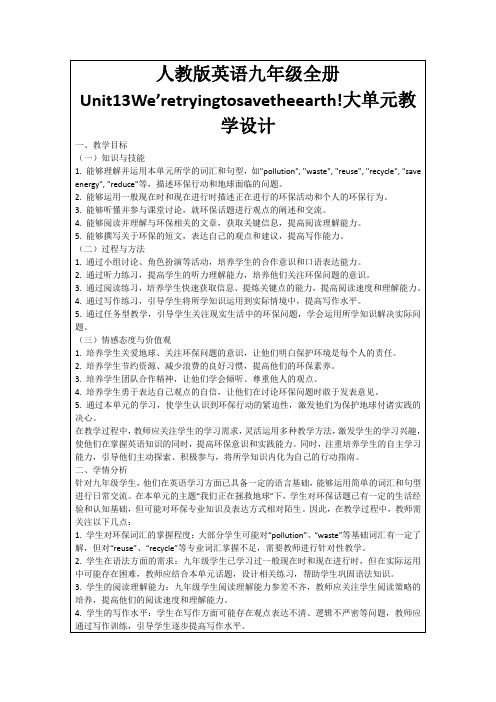
3.通过讨论,教师引入本单元的主题:“We’re trying to save the earth!”(我们正在尝试拯救地球),并简要介绍本节课的学习目标。
6.拓展延伸:鼓励学生在课后进行环保主题的研究,如调查身边的环保行为、采访环保人士等,将学习延伸到课堂之外。
四、教学内容与过程
(一)导入新课
在这一阶段,教师将采用多媒体资源和生活实例来导入新课,激发学生的学习兴趣和参与热情。
1.教师展示一系列关于地球环境问题的图片和视频,如森林砍伐、海洋污染、空气污染等,引导学生关注这些问题的严重性。
教学设想:通过词汇卡片、小组竞赛、情景剧等形式,让学生在实际语境中反复练习,加深记忆。
2.语法运用:现在进行时在描述正在进行的环保活动中的应用,以及一般现在时在陈述环保事实和习惯中的应用。
教学设想:设计语法练习,如填空、改错、句型转换等,帮助学生掌握语法规则,并通过真实的语境任务进行巩固。
3.阅读理解:提取文章主旨,理解作者观点,分析环保问题的原因和解决方案。
4.写作任务:请学生撰写一篇关于“我如何为地球环境保护做贡献”的短文,要求他们运用课堂所学的写作技巧,表达自己的观点和建议。
5.环保实践:鼓励学生在家中或学校进行一项环保实践活动,如回收废旧物品、节约用水用电等,并记录下来,在下一节课与同学分享。
6.家庭作业:布置一份综合性的家庭作业,结合本单元所学内容,要求学生观察并记录身边的环保行为,采访家人或朋友对环保的看法,整理成一篇小报告。
在教学过程中,教师应充分了解学生的学情,结合他们的需求和兴趣,设计有针对性的教学活动,激发学生的学习兴趣,提高他们的英语素养和环保意识。
人教版新目标英语九年级(全一册)Unit 13《We're trying to save the earth》短语及测试题(含答案)

Unit 13 We’re trying to save the earth!知识点和练习Phrases 1.noise/ air/ water pollution 噪音/ 空气/ 水污染the bottom of .......的底部be full of rubbish 装满垃圾 2.throw litter into the river 把垃圾扔进河里 3. put waste into the river 把废品放进河里4.write to sb. 给某人写信5. close down (工厂)关闭/ 使停业turn off 关闭(电源)6. clean up 打扫干净7. Play a part in在......方面起作用8. on the road 在路上9. burn coal烧煤10. pollute the air污染空气11. a lot of black smoke 许多黑烟12. throw away 扔掉;抛弃throw away things扔掉/抛弃东西13. in public places 在公共场所14. turn into变成turn A into B 把A变成B 15. solve the problems 解决问题16. cut down 减少,砍伐(树木)cut up 切碎cut off 切除,切掉,切断17. ride a bike 骑自行车18.the advantage(s) of ......的优点19. be good for (反义:be bad for )对......有益20. waste pollution 废品污染too much waste太多的废物21. bring a bag to go shopping 带购物袋22. wooden chopsticks 木筷子23.plastic forks 塑料叉子24. buy takeaway food 买外卖食物25. make a difference to sb./ sth. 对某人/ 某物有影响/ 起作用26. lead to a better future 引向一个更好的未来lead to 通向;导致27.take part in+ 具体的活动=join in + 具体的活动参加28.hear of/about 听说hear from sb.收到某人的来信29. in southern China 在中国南部30. a bowl of shark fin soup一碗鱼翅汤31. kill a whole shark 杀一整只鲨鱼32. each time每次33. not only ... but also ... 不仅......而且...... (并列作主语时,谓语动词采用就近原则;not only 位于句首时,它后面的主谓采用部分倒装,但but also后面的主谓不倒装)34.be cruel 残忍的35. be harmful to = be bad for 对......有害be harmful to the environment 对环境有害36.throw back into 扔回at the top of 在......顶部37. the food chain 食物链38. in the ocean’s ecosystem 在海洋生态系统中39. drop too low 下降太多40. bring danger to sb. 给某人带来危险41. be endangered 濒临灭绝的42. in fact 实际上43. in this industry 在这个行业里44. be traded 被贸易44. the number of+pl ......的数量(作主语时,谓语动词用单数形式)a number of+pl 许多(作主语时,谓语动词用复数形式)45.fall by 下降46.in the last / past +时间段在过去的...... (是现在完成时的标志)47.environmental protection groups 环保组织48. teach the public 教育公众49. develop the law形成法律50. stop the sale of shark fins 阻止鲨鱼鱼鳍的销售51. so far 到目前为止52. be in danger处于危险中53. scientific studies 科学研究54.consider doing sth. 考虑做某事55. help out帮助解决困难56.improve the environment 改善环境57. ( can/ can’t /couldn’t ) afford to do sth . 能/不能承担做某事58. take action 采取行动59.save electricity节约电60. pay for 付费61. add up 累计/累加62. improve the environment 改善环境63. use public transportation 使用公共交通运输64. parents with children 带孩子的父母65.stop riding in cars 停止开车66. recycle books and paper 回收书和纸67. turn off the shower 关掉淋浴器68. wash one’s hair 洗头发69. use paper napkins 用餐巾纸70. put sth. to good use 好好利用某物71. have a creative mind 有一个充满创意的头脑72. a most / very unusual woman一个非常不寻常的妇女the most unusual woman最不寻常的妇女73. build/ make sth. out of sth. 用某物修建/制造某物make a kite out of paper 用纸制作一只风筝74. pull down 拆下;摧毁75.upside down 上下颠倒,倒转turn upside down 翻转turned upside down 被翻转过来的76.win a prize获奖77. the Help Save Our Planet Society帮助拯救我们的星球协会78. be an inspiration to sb. 对某人是一种激励79.be good at = do well in擅长于80. use sth. to do sth. 用某物做某事81.open a small shop开一个小商店82. set up a website建立一个网站82. plan to do计划做某事83. set up a small business 经营一个小生意83.be known for+原因= be famous for+原因因......而出名be known as+职业= be famous as+职业作为......而出名84. make beautiful art pieces制作漂亮的艺术作品85. set up a theme park建立一个主题公园86.the importance of.... .......的重要性86. bring happiness to sb.把快乐带给某人87. bring back to life 使恢复生机/ 生命/ 使.......苏醒综合测试题一单项选择题()1.I don't think you've been to Disneyland, ________?A.aren't you B.haven't you C.do you D.have you()2.The villager built the bridge ________stones last year.A.out of B.out C.to D.for()3.My brother watched the football match instead of ________ his homework.A.doing B.do C.did D.does()4.—Do you know the movie Harry Potter? —Yes.I________ it twice.It's funny.A.saw B.see C.have seen D.will see()5.More natural protection areas should ________ in the future.A.set up B.to set up C.be set up D.setting up()6.—Do you like playing computer games? —No, but I ________.A.used to B.didn't C.do D.don't()7.I have never________ the strange animal before.A.heard from B.Listened C.listened to D.heard of()8.—Miss Liu, when did you come here?—In 2012.I________ here for two years.A.have been to B.have gone to C.have come D.have been()9.Lots of food and water___to Ya'an, Sichuan Province immediately after the earthquake happened.A.were sent B.are sent C.send D.sent()10.The children were hungry and the salad was quickly________ up.A.eating B.ate C.eaten D.eat()11.Look, so many passengers________ with their smart phones on the underground.A.played B.will play C.are playing D.have played()12.Great changes________ in Daqing since the 1990s.A.took place B.were taken place C.have taken place D.have been taken place ()13.—How much does the car________?—Oh, that's not too dear.It's only 100,000 yuan.A.spend B.cost C.take D.pay()14.—Have you________ the school sports meeting? —Yes, I have.A.take part B.taken part C.taken part in D.took part in()15.—What________ I do? —You'll________ study from now on if you want to go to college.A.can; may B.should; can C.should; have to D.may; could()16.________ he ________ on well with his friends this term?A.Did; get B.Does; get C.is; gotten D.Is; getting()17.Our teacher told us waste bottles should be________ good use.A.put B.put to C.to put D.puts()18.—John, your room is really in a mess.It needs________. —Sorry, Mum.I'll do it at once.A.cleans B.cleaned C.to clean D.to be cleaned()19.It’s time ______ him_____ up. Or he will be late for school.A. Of, to getB. for, to getC. Of, gettingD. for , getting()20.The are so many good restaurants. I can’t decide _____ ?A. what to eatB. how to eatC. where to eatD. when to eat二、完形填空Nancy's grandma lived in a big old house in New York.Nancy and her parents went to see her each summer.Nancy __21__ to see Grandma and bake (烘烤) with her.She liked to play cards with her, too.This summer, however, Grandma did not seem __22__.She seemed to be worried about something.“Wh at's wrong with Grandma?” Nancy asked her mom.“The __23__ pollution is bothering (使烦恼) her,” Mom said.“Do you _24__ the noise from all those cars?” Nancy asked.“Yes,” Mom said.“When Grandma moved here many years ago, there wasn't such a big _25_ here.Now there is a big road that is used to go to work easily in the city.Big trucks deliver (运载) food all over, too, by __26__ this road.They make so much noise.The noise pollution really bothers Grandma.”“I know _27__ water pollution and air pollution are.I learned about them in school, but what is noise pollution?” Nancy asked.“Pollution is __28__ that is bad for you,” Mom said.“Noise pollution can influence someone's __29__.Grandma's blood pressure goes up because of too much noise.She also has trouble __30__ with all the traffic at night.Grandma's hearing has been hurt by the noise, too.”()21.A.loved B.hated C.wanted D.feared()22.A.interesting B.Happy C.healthy D.well()23.A.water B.soil C.air D.noise()24.A.mean B.get C.tell D.point()25.A.factory B.pool C.road D.railway()26.A.cleaning B.using C.building D.making()27.A.what B.how C.where D.when()28.A.everything B.anything C.something D.nothing()29.A.diet B.habits C.health D.feelings()30.A.listening B.sleeping C.walking D.thinking三、阅读理解A large part of China experienced larger amounts of smog (雾霾) than usual and the air was badly polluted.The distance one could see was shorter than 1,000 meters in Beijing, Tianjin, and the provinces of Hebei, Henan, Shandong and Anhui.In some areas, it was down to 200 meters.People usually set off firecrackers (爆竹) to celebrate the Spring Festival.But because of the smog, this year seemed very quiet.It was really different.A man called Zhang Wei said that his friends and he hadn't set off a single firecracker.“We all suffered from last month's smog.If we don't call an end to the firecrackers, the environment will get worse and worse during t he holiday.” Said Zhang Wei.He called on more people to set off fewer firecrackers during this year's Spring Festival holiday by putting up a notice in his neighborhood.More Chinese looked forward to celebrating the holiday in a greener way.They decided not to set off firecrackers.They also decided not to waste food.They said that the new celebrations sounded fashionable.To clean the sky, more than ten provinces including Guangdong, Zhejiang and Jiangsu have started to use national 4 standard (标准), which is expected to reduce (减少) vehicle emission (车辆排放) by 30% to 50%.Beijing even has started to use the stricter national 5 standard.We still have a lot to do to improve the air quality.For example, using public transportation as much as possible is not a hard thing for us to do, but it matters a lot.()31.What happened in a large part of China this January?A.It experienced larger amounts of smog. B.People set off lots of firecrackers.C.There was a heavy rain. D.Many car accidents happened.()32.How do people usually celebrate the Spring Festival in China?A.By putting up a notice B.By setting off firecrackers.C.By not wasting food. D.By using public transportation.()33.How many provinces have started to use national 4 standard?A.Three. B.Six. C.Eight. D.More than ten.()34.Which of the following is NOT true according to the passage?A.Zhang Wei didn't set off a single firecracker this Spring Festival.B.We should use more public transportation to help reduce the air pollution.C.Zhejiang has started to use national 4 standard to reduce vehicle emission.D.More Chinese think the celebration of setting off firecracker is fashionable.()35.What's the best title for the passage?A.How to Reduce the Vehicle Emission B.How to Improve the Air QualityC.What Do Chinese Do in the Spring Festival D.Using Public Transportation四、首字母填空Travel can teach kids more than a textbook. Travelling with kids is good f 1 them. They can find new interests. Travel makes information alive for kids, and makes it much more exciting than studying textbooks or d 2 experiments in the lab. While traveling, they learn h 3 to deal with new situations, and communicate with other people. They learn patience, because sometimes i 4 takes a long time to get to some exciting or interesting places.I’ve been traveling since I was seven years old. For me, to stop traveling would be like taking something a 5 from my soul(灵魂). I can’t live without traveling and I wouldn’t be who I am if I don’t travel. Some people think it’s h 6 to travel after having kids. But in my opinion, when people become parents, it doesn’t m7 they couldn’t travel any more. My children have been traveling since they were three weeks old.Bringing a new life into the world comes with many responsibilities(责任)and I’d love to be a good mother. One of my duties is to e 8 my children. I’m so thankful that my parents took me on family trips when I was y 9 .I’ve learned that the outside world is more colorfu l than the little one I was living in. Of course, I want to pass these travel e 10 on to my children.I value the memories I have traveling with my children. I’m sure they will always remember them in their lives.1. 2. 3. 4. 5.6. 7. 8. 9. 10.1When his friend Bob saw him, he laughed and said, "What has 2 to your hair, Jack?"Jack said, "I tried a new barber's shop today, because I wasn't quite satisfied(满意的) with my 3 one, but this one seems even 4 ."Bob agreed. "Yes, I think you're right, Jack. Now I'll tell you 5 to do when you go into a barber's shop next time: look at all the barber's hair, find out 6 hair looks worst, and then go straight to him.""Why shall I go to him?" Jack asked. "But that would be foolish!""Oh, no, it wouldn't," answered Bob. "Who 7 that man's hair? Just think it. He couldn't cut it 8 , could he? Another of the barbers cut it. So you know he can't be the worst barber."1. 2. 3. 4. 5. 6. 7. 8.六.书面表达我们知道,由于环境污染、人类的残杀,很多野生动物濒临灭绝。
九年级英语全册Unit13We’retryingtosavetheearth_1
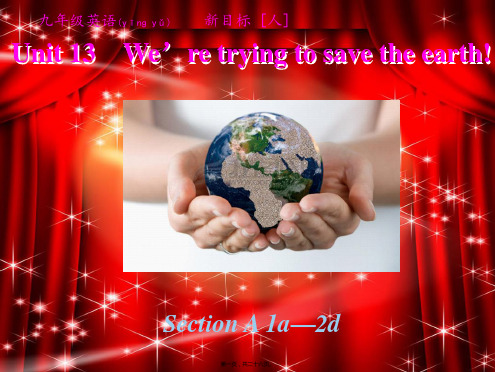
第十四页,共二十六页。
Listen again and complete the sentences.
1. The air is badly polluted because there are __________on the
rmoaodrtehecsae rdsays. 2. Factories that burn coal also _____p_o_l_luthteeair with a lot of
第十三页,共二十六页。
Listen to the interview. Circle the kinds of pollution that Jason and Susan talk about.
A. land pollution B. air pollution
C. noise pollution
noise pollution air pollution water pollution
_l_ou_d__m_u_s_ic____ __f_a_c_to_r_ie_s___ ____s_h_ip_s_____
__p_l_a_n_e_s_____ __s_m_o_k_i_n_g___ ___r_u_b_b_i_sh____
Role-play the conversation.
The river was dirty. Even the bottom of the river was full of rubbish.
But it used to be so clean!
Yes, but people are throwing litter into the river.
The problem is that…
九年级英语全册Unit13We'retryingtosavetheearth周周清4新版人教新目标版

检测内容: Unit 13 We're trying to save the earth!得分________ 卷后分________ 评价________一、单项选择。
(10×2分=20分)(C)1.Mr. Green decided to turn the garden ________ a playground ________ his children.A.from;to B.from;for C.into;for D.into;to(D)2.We'd better not use ________ material in order to protect the environment.A.ugly B.wooden C.plastic D.reusable(B)3.—Why don't you buy the computer?—It's too expensive. I can't ________ it.A.cost B.afford C.pay D.spend(A)4.The hotel is not very modern, but it does have the ________ of being close to the city center.A.advantage B.conditionC.inspiration D.creativity(A)5.Remember to ________ the light when you leave the room.A.turn off B.turn onC.turn down D.turn up(C)6.During the last ten years, our city has changed a lot. Many old houses were ________.A.turned off B.thrown awayC.pulled down D.brought back(C)7.—Dad, must we wait until the light becomes green?—Yes, I'm afraid we ________.That's the traffic rule.A.can B.may C.have to D.need(D)8.My teacher often says that mistakes should ________ in time.A.correct B.be correctingC.have corrected D.be corrected(A)9.Diana used to ________ to work, but now she is used to ________ because the road is crowded and she wants to keep fit.A.drive;walking B.drive;walkC.driving;walk D.driving;walking(B)10.The number of tall buildings ________ greatly in Tianjin in the last few years.A.is increasing B.has increasedC.are increased D.have increased二、完形填空。
人教版九年级英语全册Unit 13 We’re trying to save the earth

Exercises
●2. John played an important
part __B_____ the plan.
● A. made B. in making C. to make D. makes
Exercises
●3. — Wow, your sweater is very beautiful! How much is it?
Exercises
●5. What a nice day! We should go
sightseeing _B______ watching TV in the
hotel.
●A. because of
B. instead of
●C. together with
D. out of
Homework
loud music cars rubbish planes littering乱丢垃圾 ships factories smoking building houses mobile phones
污水
Write the words in the box below. Then add more words.
Unit 13 We’re trying to save the earth.
Section A 1a-1c
Learning objectives
● 1.To talk about different kinds of pollution; ● 2.To learn to protect environment; ● 3.To master the key words and phrases:litter, bottom, fisherman,
河南省九年级英语全册Unit13Wearetryingtosavetheearth考点题型与解题方法

河南省九年级英语全册Unit13Wearetryingtosavetheearth考点题型与解题方法单选题1、Remember ________ the light when you leave.A.closeB.to closeC.turning offD.to turn off答案:D句意:离开时记得关灯。
考查动词辨析,close关;turn off关闭(电源)。
根据“the light”可知应该是关灯,用turn off。
再结合remember to do sth“记得去做某事”,故选D。
2、—Many DIY cards ________ to mothers on Mother’s Day every year.—How creative!A.is sendingB.are sendingC.is sentD.are sent答案:D句意:——每年母亲节都会给妈妈们寄很多DIY卡片。
——多么有创意!考查被动语态。
分析句子可知,主语“Many DIY cards”和谓语“send”之间是被动关系,用被动语态be done,主语是名词复数,be动词用are。
故选D。
3、—Mmm…Delicious. What is it?—It ________ zongzi, Tony. It’s a traditional food in China.A.callsB.is calledC.calledD.was called答案:B句意:——嗯……好吃。
这是什么?——它叫粽子,托尼。
这是中国的传统食物。
考查被动语态。
根据“What is it?”可知,此处回答使用一般现在时,It指代询问的这个东西,与动词call之间为被动关系,使用被动语态,It为单数,结构为is done。
故选B。
4、—Have you seen Dr Adams recently?—No. He _________ Hong Kong for an international meeting.A.has gone inB.has been inC.has gone toD.has been to答案:C句意:——你最近见过亚当斯博士吗?——没有。
